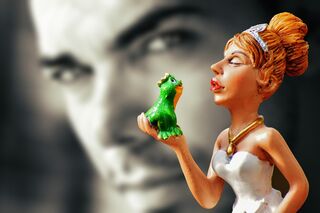Sex
Seeing What You Want to See in a Potential Partner
How does being in a sexy mood bias the way we view prospective partners?
Posted August 27, 2020 Reviewed by Lybi Ma

Successful pursuit of mating partners depends on targeting potential partners who are not only perceived as desirable but also as partners who will reciprocate one’s advances. To be sure, people often refrain from courting desired prospective partners because of the fear of being rejected by them. An optimistic outlook on one’s courting prospects may, therefore, play a key role in the decision to approach a potential partner. Such optimism often reflects the perceptions that a partner is more interested in oneself than is actually the case. This biased perception may instill the confidence people need to set aside rejection worries and to pursue the desired partner.
In our recent research1, we proposed that activating the sexual system by exposing people to sexual cues that create a sexy mindset might motivate them to take the leap of faith needed to pursue a romantic relationship. The motivation to have sex may apparently create a type of tunnel vision that produces a sense of urgency for relationship/sexual initiation while marginalizing other concerns, such as protecting oneself from being hurt.
Past research has indeed demonstrated that following activating the sexual system, people tend to behave in ways that help them become close to a stranger, such as disclosing personal information2 (read more here) or being responsive to this stranger’s needs3 (read more here). In the present research, we extended these findings by focusing on the step that precedes relationship initiation, investigating the hypothesis that sexual activation would increase one’s interest in a potential partner and the perceptions of this partner’s attractiveness and interest in oneself.
To test the effects of a sexy mindset, we conducted three studies in which we first exposed participants either to sexual (but not pornographic) stimuli or to neutral stimuli. Next, the participants encountered a potential partner and rated this partner’s attractiveness and romantic interest in them. Participants’ interest in the partner was self-reported or evaluated by raters.
In the first study, participants were randomly paired with an unacquainted participant of the other sex. Then, participants introduced themselves to each other by talking about their hobbies, positive traits, and future career plans while being videotaped. The videotaped introductions were coded for non-verbal expressions of immediacy behavior that convey interest in initiating romantic relationships (e.g., close physical proximity, frequent eye contact, flashing smiles). We found that exposure to a sexual stimulus (versus a neutral stimulus) led participants to exhibit more immediacy behavior toward a potential partner and to perceive this partner as more attractive and interested in them.
In our second study, we wished to control for the potential partner’s attractiveness and reactions. Accordingly, all participants watched the same prerecorded video introduction of a potential partner of the other sex and introduced themselves to this partner while being videotaped. These videotapes were coded for expressions of attempts to induce a favorable impression (e.g., flashing smiles and presenting oneself as a valued partner), which are typically exhibited in a dating context and are aimed at attracting desired partners. As in Study 1, we found that activation of the sexual system led participants to perceive potential partners as more attractive as well as more interested in a romantic relationship.
In the third study, we investigated whether participants’ romantic interest in the other participant might explain why sexual activation affects perceptions of others’ romantic interest in oneself. To do so, participants interacted online with another participant, who in reality was an attractive opposite-sex member of the research team, in a "get to know each other" conversation. Then, participants rated their romantic interest in the other participant as well as the other participant’s attractiveness and interest in them.
We revealed that sexual activation increased participants’ romantic interest in the other participant, which, in turn, predicted perceiving the other participant as more interested in oneself. Having active sexual thoughts apparently arouses romantic interest in a prospective partner and thereby encourages the adoption of an optimistic outlook on one’s courting prospects with this partner.
Overall, our research demonstrates that people are more likely to desire potential partners and to project their desires onto them when sexually aroused, such that a sexually tinged mindset renders these partners appealing and seemingly romantically interested in them.
These findings suggest that the sexual system prepares the ground for relationship formation by biasing interpersonal perceptions in a way that motivates human beings to connect; it does so by inspiring interest in potential partners, which, in turn, biases the perceptions of partners' interest in oneself. This cascade of reactions may help allay rejection fears and thereby reduce the costly likelihood of missing desirable mating opportunities.
The post is dedicated to the memory of Ronit Hematian, our beloved friend and colleague. Her hug will stay with us forever.
You can watch Prof. Gurit Birnbaum's TEDx talk on why humans make sex so complicated here.
This post also appeared here.
Facebook image: Friends Stock/Shutterstock
References
1. Birnbaum, G. E., Iluz, M., Plotkin, E., Tibi, L., Hematian, Mizrahi, M., & Reis, H. T. (in press). Seeing what you want to see: Sexual activation makes potential partners seem more appealing and romantically interested. Journal of Social and Personal Relationships. Research Gate
2. Birnbaum, G. E., Mizrahi, M., Kaplan, A., Kadosh, D., Kariv, D., Tabib, D., Ziv, D., Sadeh, L., & Burban, D. (2017). Sex unleashes your tongue: Sexual priming motivates self-disclosure to a new acquaintance and interest in future interactions. Personality and Social Psychology Bulletin, 43, 706-715. Research Gate
3. Birnbaum, G. E., Mizrahi, M., & Reis, H. T. (2019). Fueled by desire: Sexual activation facilitates the enactment of relationship-initiating behaviors. Journal of Social and Personal Relationships, 36(10), 3057-3074. Research Gate




